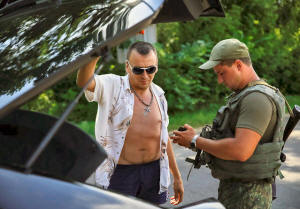|
Ukraine, after war, becomes a trove for
black market arms trade
 Send a link to a friend
Send a link to a friend
 [July 25, 2016]
By Alessandra Prentice and Anton Zverev [July 25, 2016]
By Alessandra Prentice and Anton Zverev
SLOVIANSK, Ukraine/MOSCOW (Reuters) - On
Feb. 12 last year, the same day that a ceasefire ended the worst of the
fighting in eastern Ukraine between rebels and government forces, a
former rebel fighter seized a chance to turn his inside knowledge of the
conflict into hard cash.
He traveled to a spot on the Russian-Ukrainian border where he retrieved
a cache of weapons hidden there earlier by his comrades in the
pro-Russian rebel movement.
Four days later, shortly before 6:00 p.m., he and a friend showed up in
a taxi at a fuel station in western Russia where they had arranged to
meet a contact ready to buy the arms, according to Russian court
documents.
He and the friend opened the trunk of the taxi, and began transferring
the cargo into the buyer's vehicle. Concealed in a sports bag and a
rucksack were three automatic weapons, 1,258 bullets, 20 grenades, and
20 detonators for the grenades.
The buyer was an undercover police officer and the former rebel,
identified in the court documents as Y.V. Mikhailov, was sentenced this
year to two and a half years in jail.
The fighting in eastern Ukraine between the Moscow-backed separatists
and Ukraine's pro-Western government killed hundreds of people,
displaced thousands of residents and created a Cold War-style stand off
between Moscow in the West.

It also had another consequence that is less visible but could in time
prove equally dangerous: the conflict took huge amounts of arms out of
government arsenals and put them in the hands of irregular units unable
to properly control them.
Now the fighting has subsided, according to security officials and
experts on the arms trade, the weapons are getting into the hands of
criminals and being spirited to buyers well beyond the conflict zone.
Interviews by Reuters with security officials and rebels, as well as
study of law enforcement data and court documents have shown that
weapons are being channeled out of the conflict zone in eastern Ukraine
in significant numbers, in some cases as part of an organized
underground trade.
"Of course, they have moved arms across, and they're moving them across
now," Igor, a fighter with a pro-Russian rebel unit in eastern Ukraine
told Reuters in an interview. "Mainly they take Kalashnikovs," he said.
ARSENALS PILLAGED
When, in the spring of 2014, the armed rebellion started in Ukraine's
Russian-speaking regions of Donetsk and Luhansk, police and soldiers
abandoned their bases.
That left the rebel militias to pillage the stores where Ukraine -- one
of the world's biggest arms manufacturers - kept its sizable arsenal.
Meanwhile on the pro-Ukrainian side, because the army was in
near-collapse, irregular militias were formed, some of them only loosely
part of the chain of command, and they were given, or scavenged, weapons
from official supplies.
While the fighting raged, the weapons stayed in the conflict zone. In
February 2015, the sides in the conflict agreed a ceasefire. The
fighting did not stop, but the intensity subsided, and weapons started
leaking out of the battlefield.
Official data is patchy but what figures there are indicate the problem
is getting worse. The number of prosecutions for weapons offences so far
this year in Ukraine is double the amount for the whole of 2015,
according to the general prosecutor's office.

In many cases, the cause is negligence. Irregular units often do not
keep proper control of the weapons in their inventories or fail to make
soldiers surrender their guns when they go on leave.
“It’s mostly people taking them home for the sake of it," said Serhiy
Alyoshin, the chief of police in the town of Sloviansk, which is on the
edge of the conflict zone and controlled by Kiev.
"Some say ‘I forgot’, some say ‘It’s for fishing’ or ‘It’s a present for
a friend’ and then we hear about these things blowing up in apartments,
in yards and on the street. It’s a threat to national security.”
In some cases, Ukrainian security officials said, irregular
pro-government units set up private weapons caches to avoid surrendering
their arms to the authorities in Kiev, whom they do not trust.
In March this year, the police force in Sloviansk uncovered a cache of
weapons and explosives in the back of a garage filled with cardboard
boxes and household junk.
In police footage seen by Reuters, officers laid the weapons and
explosives out on the ground. There were at least three anti-tank rocket
launchers, several rockets, hundreds of bullets, around 15 hand grenades
and two anti-tank mines.
ORGANIZED CRIME
But there is evidence too of criminal intent to smuggle weapons out for
sale to organized crime groups.
[to top of second column] |

A Ukrainian serviceman checks documents at a checkpoint near
Slaviansk in Donetsk region, Ukraine, June 29, 2016. Picture taken
June 29, 2016. REUTERS/Gleb Garanich

"Of course, anyone who has the will and the means can get into the
business - organized criminal groups have always traded weapons,"
said Olena Hitlyanska, a spokeswoman for Ukraine's State Security
service, or SBU. "Now the channel for buying these illegal weapons
has widened," she said.
"In past years we seized pistols and rifles that people had in their
own collections or for hunting. Now grenade launchers are seized,
and blocks of TNT."
Igor, the rebel fighter, said there was now a well-organized trade
in illegal weapons from eastern Ukraine into Russia.
"If before they shipped whatever came to hand, now it happens in a
more orderly fashion, practically by appointment," said Igor, who
asked to be identified only by his first name for fear of reprisals
for speaking about the trade.
In one rebel unit "they practically keep a list of who will take the
iron across the border and when," he said, using a slang term for
weapons.
He said the weapons were smuggled from rebel-controlled eastern
Ukraine into Russia via illegal border crossings.
He said much of the smuggling was done by rebel fighters from
Chechnya and Ingushetia, in Russia's volatile North Caucasus region,
who ship the weapons back home.
A spokesman for the rebel administration in eastern Ukraine's
Donetsk region, Eduard Basurin, said about arms smuggling: "Maybe at
one point it was present, but that this is being done in an
orchestrated way, that's rubbish."
DESTINATION: MIDDLE EAST
So far, there is little evidence of where the weapons smuggled out
of the Ukraine conflict zone end up.
In May, Ukrainian border guards detained a 25-year-old Frenchman
with ties to far-right groups in France who was trying to cross from
Ukraine into Poland with weapons including rocket launchers and
Kalashnikov assault rifles in his Renault van.

Ukraine's SBU said the man had made contact with armed militias in
Ukraine and inquired about buying arms from them. When they found
out about this, the SBU said its agents sold the man deactivated
weapons.
But that case appears to be an outlier. The illegal arms trade in
western Europe -- where the items most in demand are small
quantities of light firearms -- is dominated by supplies from
ex-Yugoslavia, and it is unlikely Ukrainian weapons would be able to
break into that market.
Instead, most of the weapons from Ukraine will be destined for other
conflict zones in places such as Iraq, Syria and Libya where there
is a demand for heavy weapons in large enough quantities to make it
worthwhile for black market arms dealers.
Mark Galeotti, an expert on ex-Soviet organized crime, said some of
those Ukrainian weapons would be transported through the Ukrainian
Black Sea port of Odessa, then into the Mediterranean, some south
through the Balkans, and some through Russia's North Caucasus
region.
"Usually it is relatively easy to get a pistol or anything up to an
assault rifle," said Galeotti, senior research fellow at the
Institute of International Relations Prague.
"But it is much harder to get an RPG (rocket-propelled grenade) or a
machine gun or the boring things like spare parts for the above. You
actually need to have a proper war for these sorts of things to
become available and, lo and behold, you have a proper war," he
said.
"At the moment you have, from the criminals' point of view, a
wonderful opportunity."
(Additional reporting by Jason Bush, Wiktor Szary and Christian
Lowe; writing by Christian Lowe; editing by Peter Graff)
[© 2016 Thomson Reuters. All rights
reserved.]
Copyright 2016 Reuters. All rights reserved. This material may not be published,
broadcast, rewritten or redistributed.
 |